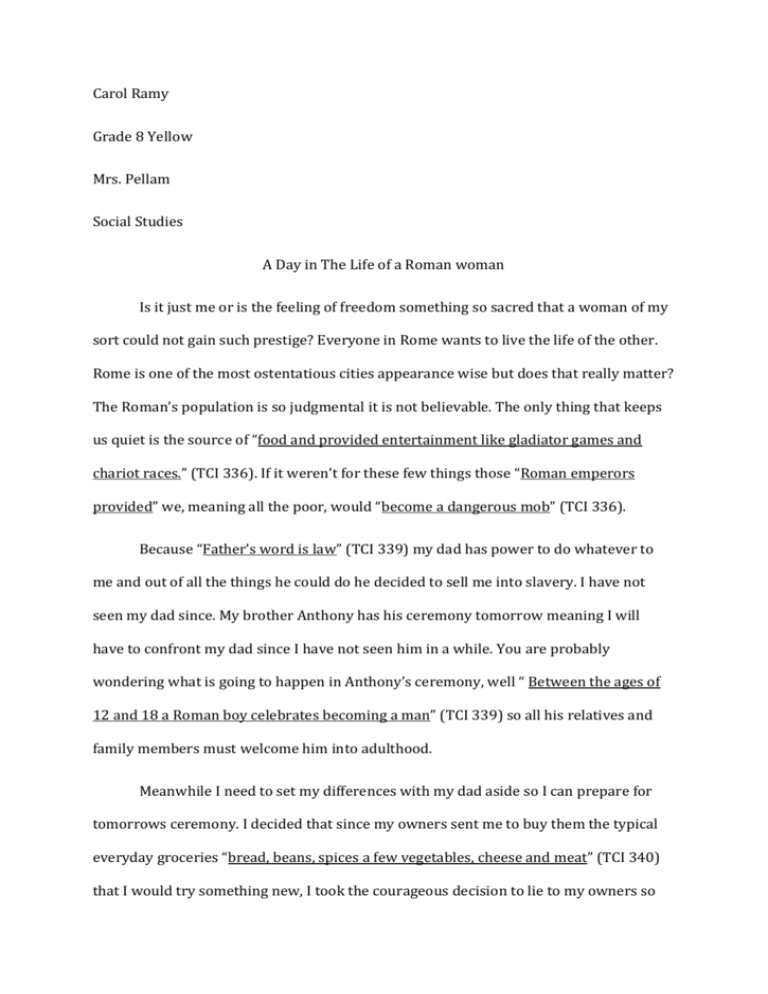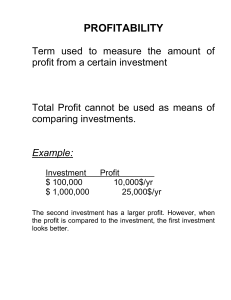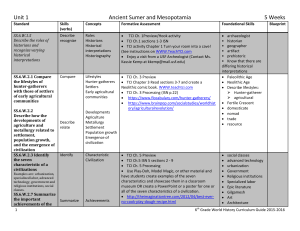File
advertisement

Carol Ramy Grade 8 Yellow Mrs. Pellam Social Studies A Day in The Life of a Roman woman Is it just me or is the feeling of freedom something so sacred that a woman of my sort could not gain such prestige? Everyone in Rome wants to live the life of the other. Rome is one of the most ostentatious cities appearance wise but does that really matter? The Roman’s population is so judgmental it is not believable. The only thing that keeps us quiet is the source of “food and provided entertainment like gladiator games and chariot races.” (TCI 336). If it weren’t for these few things those “Roman emperors provided” we, meaning all the poor, would “become a dangerous mob” (TCI 336). Because “Father’s word is law” (TCI 339) my dad has power to do whatever to me and out of all the things he could do he decided to sell me into slavery. I have not seen my dad since. My brother Anthony has his ceremony tomorrow meaning I will have to confront my dad since I have not seen him in a while. You are probably wondering what is going to happen in Anthony’s ceremony, well “ Between the ages of 12 and 18 a Roman boy celebrates becoming a man” (TCI 339) so all his relatives and family members must welcome him into adulthood. Meanwhile I need to set my differences with my dad aside so I can prepare for tomorrows ceremony. I decided that since my owners sent me to buy them the typical everyday groceries “bread, beans, spices a few vegetables, cheese and meat” (TCI 340) that I would try something new, I took the courageous decision to lie to my owners so that I could keep the left over money from today’s groceries. My plan was to save the excess money from today’s groceries to get some food from the thermopolia there was a lady there that had different bird species “on display to attract customers” (TCI 340), the shelves were packed full of chickens, geese and rabbits and even that salted fish that I liked growing up. After shopping I returned to my owner’s house. Their house was extremely easy to recognize because they lived in “grand houses built of stone and marble.” (TCI 341). I walked passed the atrium and the cool pool in the center of the hallway the atriums walls were “covered in pictures, both painted murals and mosaics made of tiles.” (TCI 341). Next thing I knew I was greeted by golden statues with such fine details watching me from the corners. I could smell smoke outside the gold covered window so I looked outside to see a poor family “without proper kitchens, the poor cooked their meals on portable grills,” (TCI 341). I never really understood why there was such a huge difference between the life of an affluent Roman and an poor Roman. Furthermore, after I pretty much dozed off at the beauty of the house I was drawn back to reality when I almost tripped on a dead mouse. I decided that the rodent would be a good sacrifice to go along with my honey cakes. I “often left gifts of food, such as honey cakes and fruits” I also “sacrificed animals including bulls, sheep and oxen.” (TCI 338). On my way to the Roman shrine and temple I passed by emperor Caligula’s statue. Emperor Caligula “had a temple built to house a statue of him made of gold. Every day the statue was dressed in the type of clothing Caligula was wearing that day” (TCI 338). Caligula was wearing a white toga with brown sandals with gold lining on the outside and a copper neckless around his neck. On my way back to my owners’ house I got tired so I decided to rest on the floor. I could hear the students older that six or seven being tutored in public buildings. Because “classes were held in public buildings or home” (TCI 342). Wealthy Romans had to wake up early walk passed crowded streets with their school supplies and head towards local breakfast bars. “There they bought beans, nuts and freshly baked bread to munch on while they walked to class.” (TCI 342). Small stools were placed around the tutor, normally an educated Greek slave, while they used styluses, “a pointed instruments used for writing”, to copy down lessons from the board. I got up and walked some more and to my left I could hear cheers and laughter and after analyzing the voices I could hear I understood what it was. Since “the rich enjoyed going to plays in public theaters and musical performances in one another’s home.”, as I listened to the musical performances in the affluent romans house I remembered all the chariot races I attended growing up. You see one of the few things that did not separate the rich from the poor was recreation and entertainment. “Besides the many festivals throughout the year, rich and poor alike flocked to two spectacles: gladiator games and chariot races.” (TCI 343). I remembered going to the Circus Maximus and meeting new people it made my day less stressful knowing I had work to do, food to cook and expectations to meet.











